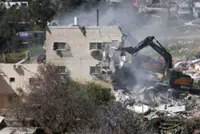JERUSALEM (Reuters): Palestinian Rabeha Rajabi did not think she would be holding her wedding celebrations in the rubble of her own home in occupied East Jerusalem, until Israeli authorities destroyed it.
"Before any blow hit the house, it hit our hearts," said Rajabi, speaking among the debris and donning a traditional Palestinian thobe and henna-inked hands. "This was our home, our dream, our memories."




